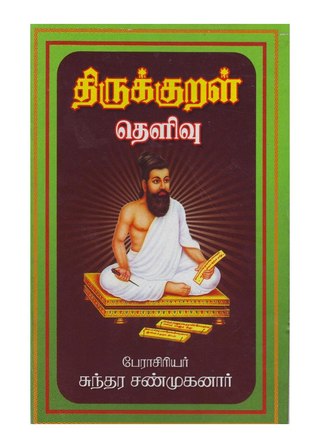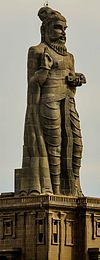Related Research Articles

Thiruvalluvar, commonly known as Valluvar, was an Indian poet and philosopher. He is best known as the author of the Tirukkuṟaḷ, a collection of couplets on ethics, political and economic matters, and love. The text is considered an exceptional and widely cherished work of Tamil literature.
Parimelalhagar, sometimes spelled Parimelazhagar, born Vanduvarai Perumal, was a Tamil poet and scholar known for his commentary on the Thirukkural. He was the last among the canon of ten medieval commentators of the Kural text most highly esteemed by scholars. He was also among the five oldest commentators whose commentaries had been preserved and made available to the Modern era, the others being Manakkudavar, Pari Perumal, Kaalingar, and Paridhi. Of all the ancient commentaries available of the Kural literature, Parimelalhagar's commentary is considered by scholars as the best both in textual and literary aspects. The codification of the writings of Valluvar is attributed to Parimelalhagar. Parimelalhagar also remains the most reviewed, in terms of both praise and criticism, of all the medieval Kural commentators. Praised for its literary richness and clarity, Parimelalhagar's commentary is considered highly complex and exquisite in its own right that it has several scholarly commentaries appearing over the centuries to elucidate it. Along with the Kural text, Parimelalhagar's commentary has been widely published that it is in itself regarded a Tamil classic.

The Tirukkuṟaḷ, or shortly theKural, is a classic Tamil language text consisting of 1,330 short couplets, or kurals, of seven words each. The text is divided into three books with aphoristic teachings on virtue (aram), wealth (porul) and love (inbam), respectively. It is widely acknowledged for its universality and secular nature. Its authorship is traditionally attributed to Valluvar, also known in full as Thiruvalluvar. The text has been dated variously from 300 BCE to 5th century CE. The traditional accounts describe it as the last work of the third Sangam, but linguistic analysis suggests a later date of 450 to 500 CE and that it was composed after the Sangam period.
Tirukkural, also known as the Kural, an ancient Indian treatise on the ethics and morality of the commoner, is one of the most widely translated non-religious works in the world. Authored by the ancient Tamil poet-philosopher Thiruvalluvar, the work has been translated into 57 languages, with a total of 350 individual translations, including 143 different renderings in the English language alone.

Tirukkural remains one of the most widely translated non-religious works in the world. As of 2014, there were at least 57 versions available in the English language alone. English, thus, continues to remain the language with most number of translations available of the Kural text.
Manakkudavar was a Tamil scholar and commentator known for his commentary on the Tirukkural. His is the earliest of the available commentaries on the Kural text, and hence considered to bear closest semblance with the original work by Valluvar. He was among the canon of Ten Medieval Commentators of the Kural text most highly esteemed by scholars. He was also among the five ancient commentators whose commentaries had been preserved and made available to the modern era, the others being Pari Perumal, Kaalingar, Paridhi, and Parimelalhagar.
Kaalingar, also known as Kalingarayar, was a Tamil scholar and commentator known for his commentary on the Thirukkural. He was among the canon of Ten Medieval Commentators of the Kural text highly esteemed by scholars. He was also among the five ancient commentators whose commentaries had been preserved and made available to the Modern era, the others being Manakkudavar, Pari Perumal, Paridhi, and Parimelalhagar.
Pari Perumal, also known as Kaviperumal, was a Tamil scholar and commentator known for his commentary on the Thirukkural. He was among the canon of Ten Medieval Commentators of the Kural text most highly esteemed by scholars. He was also among the five ancient commentators whose commentaries had been preserved and made available to the Modern era, the others being Manakkudavar, Kaalingar, Paridhi, and Parimelalhagar.
K. Vadivelu Chettiar (1863–1936) was a Tamil scholar of the early twentieth century. He is best known for his exegesis on the Parimelalhagar's commentary to the Tirukkural.
Paridhi, also referred to as Paridhiyaar, was a Tamil literary commentator known for his commentary on the Thirukkural. He was among the canon of ten medieval commentators of the Kural text most highly esteemed by scholars. He was also among the five ancient commentators whose commentaries had been preserved and made available to the Modern era, the others being Manakkudavar, Pari Perumal, Kaalingar, and Parimelalhagar.
Dharumar was a Tamil poet, scholar, and commentator known for his commentary on the Thirukkural. He was among the canon of Ten Medieval Commentators of the Kural text most highly esteemed by modern scholars. His work, however, has been lost along with other four ancient commentators, namely, Dhamatthar, Nacchar, Thirumalaiyar, and Mallar. He was also one of the three ancient commentators of the Naladiyar.
Nacchar, also known as Nakkar, was a Tamil poet, scholar, and commentator known for his commentary on the Thirukkural. He was among the canon of ten medieval commentators of the Kural text most highly esteemed by modern scholars. However, his work has been lost along with other four ancient commentators, namely, Dhamatthar, Dharumar, Thirumalaiyar, and Mallar.
Thirumalaiyar was a Tamil poet, scholar, and commentator known for his commentary on the Thirukkural. He was among the canon of Ten Medieval Commentators of the Kural text most highly esteemed by modern scholars. His work, however, has been lost along with other four ancient commentators, namely, Dhamatthar, Nacchar, Dharumar, and Mallar.
The Ten Medieval Commentators were a canonical group of Tamil scholars whose commentaries on the ancient Indian didactic work of the Kural are esteemed by later scholars as worthy of critical analysis. These scholars lived in the Medieval era between the 10th and 13th centuries CE. Among these medieval commentaries, the commentaries of Manakkudavar, Kaalingar, and Parimelalhagar are considered pioneer by modern scholars.
The Book ofAṟam, in full Aṟattuppāl, also known as the Book of Virtue, the First Book or Book One in translated versions, is the first of the three books or parts of the Kural literature, a didactic work authored by the ancient Indian philosopher Valluvar. Written in High Tamil distich form, it has 38 chapters each containing 10 kurals or couplets, making a total of 380 couplets, all dealing with the fundamental virtues of an individual. Aṟam, the Tamil term that loosely corresponds to the English term 'virtue', correlates with the first of the four ancient Indian values of dharma, artha, kama and moksha. The Book of Aṟam exclusively deals with virtues independent of the surroundings, including the vital principles of non-violence, moral vegetarianism,[a] veracity, and righteousness.
Tiruvalluva Malai is an anthology of ancient Tamil paeans containing fifty-five verses each attributed to different poets praising the ancient work of the Kural and its author Tiruvalluvar. With the poets' time spanning across centuries starting from around 1st century CE, the collection is believed to have reached its present form by 10th century CE. With the historical details of the ancient philosopher and his work remaining obscure, much of the legend on the Kural and Tiruvalluvar as they are known today are chiefly from this work. The collection also reveals the name of the author of the Kural text as 'Tiruvalluvar' for the first time, as Tiruvalluvar himself composed the Kural text centuries earlier without indicating his name anywhere in his work. Reminiscing this, E. S. Ariel, a French scholar of the 19th century, famously said of the Tirukkural thus: Ce livre sans nom, par un autre sans nom.
The Book of Inbam, in full Iṉbattuppāl, or in a more sanskritized term Kāmattuppāl, also known as the Book of Love, the Third Book or Book Three in translated versions, is the third of the three books or parts of the Kural literature, authored by the ancient Indian philosopher Valluvar. Written in High Tamil distich form, it has 25 chapters each containing 10 kurals or couplets, making a total of 250 couplets all dealing with human love. The term inbam or kamam, which means 'pleasure', correlates with the third of the four ancient Indian values of dharma, artha, kama and moksha. However, unlike Kamasutra, which deals with different methods of lovemaking, the Book of Inbam expounds the virtues and emotions involved in conjugal love between a man and a woman, or virtues of an individual within the walls of intimacy, keeping aṟam or dharma as the base.
Umapathi Shivachariyar was a Tamil poet and scholar. It is from his writings that details about earlier poets, chiefly Parimelalhagar, have become known.

Sivagyana Munivar was a saivite sage and scholar from Tirunelveli, Tamil Nadu. He was well versed in both Tamil and Sanskrit.

Commentaries to literary works remain one of the most important and telling aspects of the Tamil literary tradition. Commentaries to ancient Tamil works have been written since the medieval period and continue to be written in the modern era. Many ancient Tamil works continue to remain in comprehension chiefly due to exegesis or commentaries written on them. The most famous examples of such works are the Tolkappiyam and the Tirukkural, with the latter remaining the most reviewed work in the Tamil literature.
References
- R. Mohan and Nellai N. Sokkalingam (2011). உரை மரபுகள் [Conventions of Commentaries]. Chidambaram: Meiyappan Padhippagam.
- G. P. Chellammal (2015). திருக்குறள் ஆய்வுக் கோவை [Tirukkural Research Compendium] (in Tamil) (1 ed.). Chennai: Manivasagar Padhippagam.
- Vamanan (1 November 2021). "Returning to the classic commentary of Thirukkural". The Times of India. Chennai: The Times Group. Retrieved 1 November 2021.
